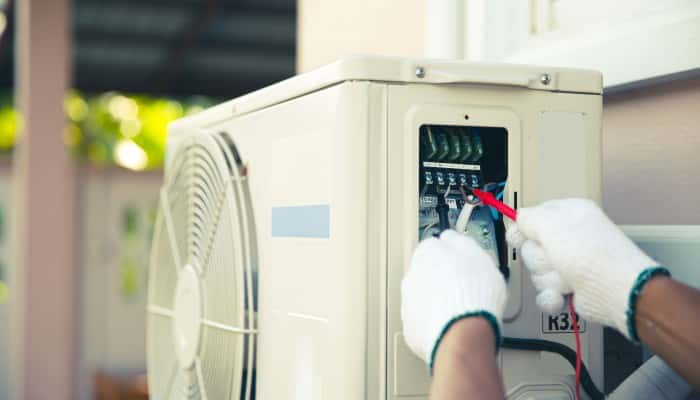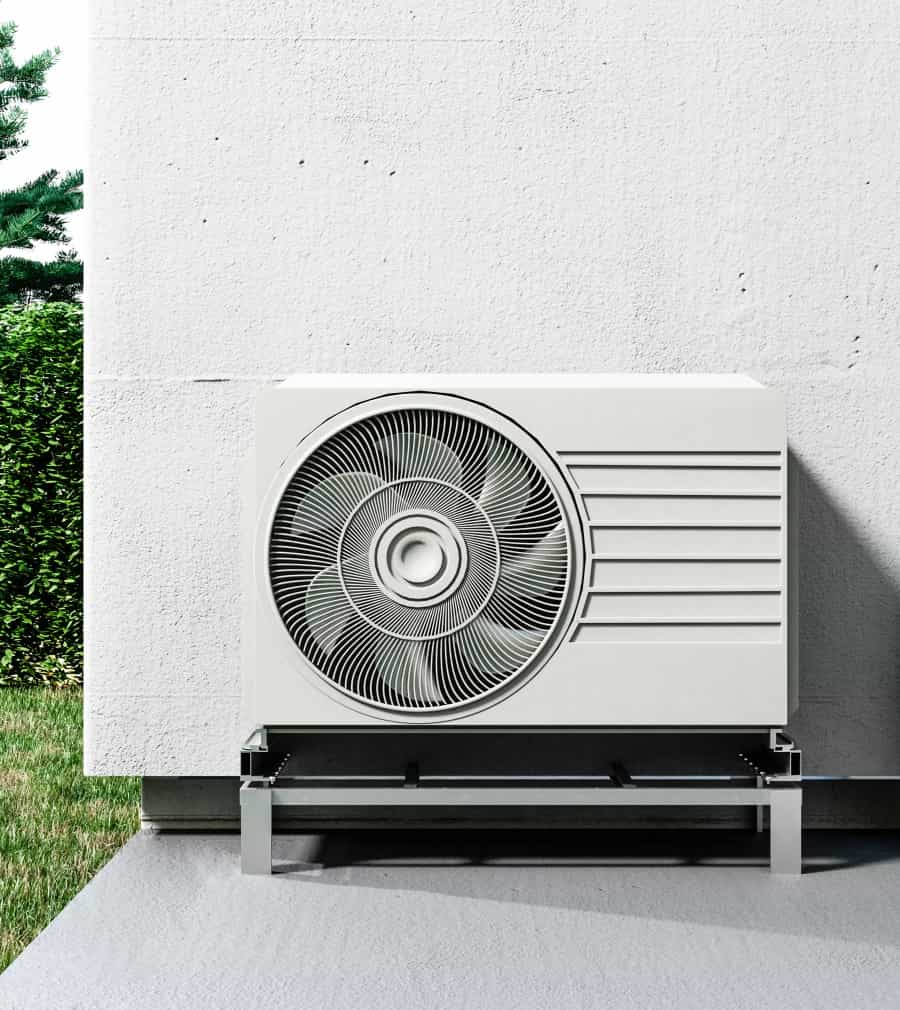If you are living in England, Wales or Scotland, you can apply for air source heat pump grants that cut the cost of installing one in your home. Want to know if you qualify? You are just a call away to getting started!
Air source heat pumps are very efficient as renewable energy solutions for properties, providing effective heating to homes. However, the availability and size of these grants for heat pumps from the government is largely dependent on your location. For instance, certain rural areas in Scotland may assess grants up to £9,000.
What is an Air Source Heat Pump?
These renewable energy solutions are a more suitable, sustainable and energy efficient alternative to traditional fossil fuel heating. Air source heat pumps play a key role to help the UK government achieve its goal of zero carbon emission in the coming years thanks to their high efficiency and green properties.
As long as they are well designed and installed and in a well-insulated house, they are actually more eco-friendly than traditional gas boilers. Air source heat pumps utilise the warmth in the air in your surroundings to supply the heating your home requires.
Air Source Heat Pump Grants: Overview for England, Scotland, and Wales
Residents of England and Wales may apply for grants up to £7500 for air source heat pump installation through the boiler upgrade scheme. This scheme covers all kinds of heat pump installations in homes.
For residents of Scotland, an air source heat pump is covered by the grant from Home Energy Scotland. Qualified homeowners may access grants of £7500, which increases to 9500 for people living in rural areas. Besides this grant, an interest-free loan of £7500 is also available to eligible households to cover any remaining cost of installation. This means most homes can receive up to £15000 in financial support for their air source heat pump installation.
How do Air Source Heat Pumps Operate?
Imagine the air in your surroundings as the source. Air source heat pumps extract heat from the outside air (even in cold conditions) and use it to warm your home. Their mode of operation is like a refrigeration cycle which is essentially a reverse of how a refrigerator works.
Air source heat pumps work by first drawing in air from the outside which is transferred over an evaporator where R32 refrigerant comes in contact with this air. The liquid refrigerant has a low boiling point and heats up, becoming a gas and sucks in the latent heat energy present in the air. The gas is then compressed to increase the heat content in the refrigerant before it is passed through a heat exchanger. At this point, the gas condenses, reverting to a liquid while transferring the heat to the water of the heating system. The cycle is repeated as the liquid refrigerant is then circulated again through the evaporator.
The water of the heating system which has been heated up goes out through the rear of the heat pump through pipes and is circulated throughout the entire heating system of the home to provide both space heating and hot water.
To know if you are eligible to receive air source heat pump government grants, you will need to contact the relevant authorities who are responsible for energy efficiency in your region. They will provide you with tailored detailed information about available heat pump UK grants, subsides or other incentives in your country.
Need to learn more about your eligibility? Call us today.
Try the Free Eligibility Checker
Types of Air Source Heat Pumps
Air source heat pumps are of two types- the air-to-air heat pumps and air-to-water heat pumps.
These heat pumps extract heat from the outside hair and transfer it into the home through fan coil units located in each room. These heat pumps do not heat water.
These pumps, apart from heating water, also heat the air. They draw in heat energy from the outdoor air and transfer this into water. They work transferring this heat in the air into 'wet' heating systems such as radiators or underfloor heating. Air-to-water heat pumps also heat water stored in a cylinder which then provides hot water to the home.
Who qualifies for Free Air Source Heat Pump Grants?
Usually, those who will benefit from these grants include homeowners, small landlords, private landlords, and tenants of private-sector landlords.
For instance, the Nest Scheme in Wales aims at improving homes with poor insulation or energy efficiency. To qualify, you must be in receipt of some means-tested benefits.
While there are general eligibility criteria for free air source heat pump grants, eligibility criteria may vary based on location and type of program.
However, below are some factors that may be considered to know if you are eligible or not;
-
Some of the grant programs under the air source heat pumps grants may require that your property meets a specific energy efficiency or has a certain energy rating before it can be considered for the grant. This is so that when installed, an air source heat pump will actually bring about optimal energy efficiency and savings.
-
The type of heating system currently in use in your home can also be a factor to determine if you are eligible. For instance, properties which rely on less efficient or higher carbon-emitting systems such as older gas furnaces, old boilers, etc. may be prioritised. This is to ensure that these less efficient energy systems are replaced with better alternatives like the air source heat pump.
-
Additionally, properties in areas where there are high greenhouse gas emissions or where renewable energy adoption is a priority will be favoured for this grant.
-
The Grant will also prioritise people whose properties are suitable for air source heat pump installation. Properties will be checked if they have enough space for the installation, access to outdoor areas as well as insulation of the building.
We recommend that you consult a professional heating engineer to get specific advice for your home.
How can I apply for Air Source Heat Pump Grants?
The steps involved in applying for an air source heat pump grant varies depending on your location, and the specific scheme you are applying to.
Generally, Scotland residents can apply directly to the Home Energy Scotland scheme. While in the case of England and Wales, application cannot be made directly. You can only apply through your chosen MS-Certified installer.
Interested? Contact us today to learn about eligibility!
Find Out If You Are Eligible
Advantages of Air Source Heat Pump Grants
Here are some of the benefits of installing an air source heat pump;
-
They are energy efficient as they use only minimal electricity when extracting heat from the outdoor air and transferring it into a home.
-
Government grants for air source heat pumps are also beneficial as they provide financial assistance, helping deserving households to offset the costs of buying and installing an air source heat pump, thus making it cost effective.
-
Air source heat pumps are efficient in environmental sustainability as they are a renewable heating solution. They reduce the dependence on fossil fuels since they make use of heat energy in the air. This reduces a home’s carbon footprint.
-
By providing efficient and even distribution of heat for the home, they improve home comfort.
-
Air source heat pumps are also very durable and can last more than 20 years when maintained properly. This represents a wise investment to serve your home’s heating needs in the long term
-
Installing energy-efficient measures such as a heat pump also increases the value of your property.
-
Air source heat pumps can also be installed or integrated alongside other renewable systems

Disadvantages of Air Source Heat Pumps:
-
The downsides to installing an air source heat pump is that the initial installation cost can be very expensive.
-
There are specific space requirements a property should meet for it to be eligible for the government grants for heat pumps.
-
Your home needs good insulation to qualify for heat source pumps grants.
What are the Available Heat Source Pumps Grants For UK Homes?
Some of the available UK heat pump grants in 2023 include:
-
Boiler Upgrade Scheme (BUS)
-
Warmer Homes Scotland Scheme
-
Energy Company Obligation (ECO) Scheme
Frequently Asked Question
There are different government-initiated air source heat pumps grants available which are all aimed at energy efficiency and reducing cost. They include;
-
Nest Scheme Wales: This is specifically meant for Welsh households who can profit from air source heat pumps as part of other large-scale improvements made towards energy efficiency.
-
The Boiler Upgrade Scheme: These are for homeowners in England and Wales. The scheme offers £5,000 towards the costs of installing a new air source heat pump and £6,000 towards the cost of a new ground source heat pump.
-
Home Energy Scotland: Here Scottish homeowners, and tenants of private landlords benefit from heat pump funding as well as other energy-efficiency packages, whose costs are mostly covered by the Scottish government.
For the installation of a new air source heat pump, households will receive a £5,000 grant while a grant of £6,000 will be given to properties that require a ground source heat pump since they are more expensive to install.
Also, those installing a biomass boiler will get £5,000 grants.
NB: Those eligible for biomass boiler grants are those in rural areas whose properties are not connected to the gas grid.
The grants received are meant to help households with the cost and installation of the heat pump or biomass boiler, as well as any home adjustments needed including installation of new radiators for your new heat pump.
Of course, heat pumps can either be installed on their own or integrated with other renewables including a solar thermal system.
You can actually enjoy optimal energy savings and reduce energy bills when you combine heating technologies.
To merit the boiler upgrade scheme, you should meet the following eligibility criteria.
-
You should be a homeowner, small landlord, or private landlord in England or Wales.
-
You must possess a relevant Energy Performance Certificate with no unresolved loft or cavity wall insulation recommendations.
-
You are only allowed to replace fossil fuel heating systems (e.g. oil, gas, direct electric). You cannot replace an existing low-carbon heating system
-
You must have an installation capacity up to 45kWth. This is common in the majority of UK properties.

